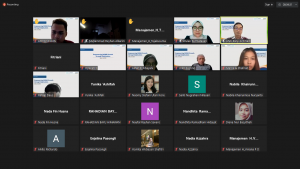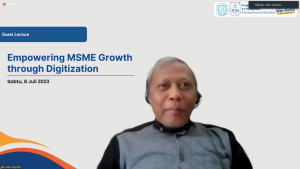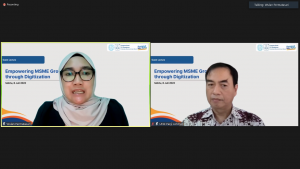
Undergraduate Management Study Program Presents Head Analyst of Bank Indonesia in Guest Lecture on Digitization of MSMEs
The Management Study Program (MSP) hosted a Guest Lecture presenting an invited speaker from Bank Indonesia. The Guest Lecture entitled Empowering MSME Growth through Digitization was held virtually through Zoom Cloud Meeting on Saturday (07/08/2023). The guest lecture presents Dr. Panji Achmad, LL.M., Group Head/Director of the Legal Department of Bank Indonesia who discussed four important points in digitalization development in MSMEs.
These points include the duties and authorities of the central bank after the enactment of Law No. 4 of 2023 concerning the Development and Strengthening of the Financial Sector (P2SK Law), the application of omnibus law of the financial system, Bank Indonesia and payment systems in Indonesia, and the development of MSMEs and digitalization in Central Java.
The event, which lasted for approximately two hours, opened with Dr. Joko Suyono’s remarks. Through his remarks, he revealed that this guest lecture was attended by the majority of MSP students in the final semester who participated in the MBKM program. “We hope that today’s material can enrich students’ knowledge on how to manage MSMEs related to digitalization,” said Dr. Joko Suyono.
 In line with Dr. Joko, Dr. Panji stated that the objectives of the guest lecture are in line with BI duties related to the empowerment of MSMEs. Hence, creating a well-synchronized guest lecture theme. This is because currently Bank Indonesia is actively engaged in disseminating new regulations related to omnibus law or P2SK Law. “Digitization helps MSMEs during the Covid pandemic. Without digitalization, perhaps the effect of the pandemic will be more severe for MSMEs,” said Dr. Panji.
In line with Dr. Joko, Dr. Panji stated that the objectives of the guest lecture are in line with BI duties related to the empowerment of MSMEs. Hence, creating a well-synchronized guest lecture theme. This is because currently Bank Indonesia is actively engaged in disseminating new regulations related to omnibus law or P2SK Law. “Digitization helps MSMEs during the Covid pandemic. Without digitalization, perhaps the effect of the pandemic will be more severe for MSMEs,” said Dr. Panji.
In addition to serving as the central bank in Indonesia, the BI participates in the development of MSMEs, among others, through mentoring, financial literacy, and price stability. In this case, BI’s duties in the P2SK Law include issuing legal tender, formulating and implementing monetary policy, regulating and maintaining the seamless flow of the payment system, maintaining financial system stability through macroprudential regulation and supervision, and carrying out the function of “the lender of the last resort.”
Regarding the development of the digital payment sector, he said that consumers need to consider the balance between the risks and the functionality of digital payment tools. This is related to the many security risks, inherent to the use of such digital systems. “Henceforth, all payment systems in Indonesia must be under the supervision of the central bank, there should be no ‘shadow banking’ (banks that do not comply/do not follow BI regulations). The payment system must be connected to the banking system. One of the technological advancements launched by BI is the use of a QR code, named the QR code Indonesian Standard. The implementation of QRIS is highly beneficial, especially during the Covid-19 pandemic,” he explained.
In fact, this QRIS has developed into a cross-border QRIS, which now has been adopted in Thailand, Malaysia, and finally legalized in Singapore. In line with the development of the official payment system built by BI, according to data from the Ministry of Cooperatives and MSMEs, in 2022, there were 20.76 million MSME units that had implemented the digital ecosystem. Under this MSME development framework, BI provides MSME development programs and inclusive finance.
“According to the digitization statistics in Central Java, the largest users of digital payment are Generation Z and millennials. In 2022, the number of SMEs that have entered the digital ecosystem increased 26.6% compared to 2021. Meanwhile, the Kemenkop target for 2024 is 30 million MSME units joining this digital ecosystem.”
The enthusiasm of students for the material of the Indonesian financial system was seen during the question-and-answer session, where Dr. Panji said several times that the questions asked by students were very interesting and important.
At the end of the question-and-answer session, Dr. Panji conveyed two important suggestions related to the usage of digital payment systems. “Use digital payments wisely. Be careful in carrying out digital transactions,” he stressed. Concluding the Guest lecture on this occasion, Dr. Wulan Permatasari, SE., MM., SHRM-CP., the moderator of the event expressed her gratitude to Dr. Panji for his comprehensive material.
“Pak Panji discussed a lot about the development of MSMEs in Central Java and Indonesia. This is a very useful material because many students at FEB UNS do not understand the payment system in Indonesia. Hopefully, in the future, Mr. Panji will be able to share his knowledge and experience with FEB UNS students. Thank you to the participants and the MSP FEB UNS PKKM Task Force Team. Thank you, Mr. Panji, for your knowledge and sharing,” she said, ending the Guest Lecture session.

